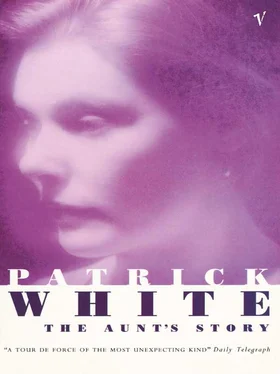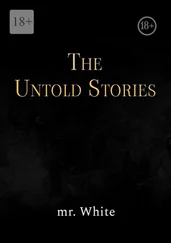‘Well,’ said Mrs Rapallo, chewing the word in her once more careful mouth, ‘now we are sober.’
She sighed. Across the empty asphalt the crimson trailed its flat rag. Her glove fingered a tatter that her mind was attempting to explain.
‘I have been on my evening walk,’ Mrs Rapallo said. ‘Most evenings I walk as far as the poste restante . Just in case. Though tonight, of course, after this morning’s bounty, I hardly expected more. Gloria is so good.’
Theodora could not contradict, because Gloria was still a blur. Whether her nails tore flesh as well as bread, she did not yet know.
‘Does she write often?’ she asked.
‘One must expect women of rank to make certain sacrifices. One accepts to be the sacrifice. Willingly,’ Mrs Rapallo said.
At moments when she was composed, resigned, Elsie Rapallo, née van Tuyl, had the stiff and formal look of something on an occasional table, but an Edwardian occasional table, something in enamel or cloisonné, commissioned by a Grand Duke in order to show his patronage, and then forgotten.
‘Gloria had a vocation for the world,’ Mrs Rapallo explained. ‘I mean, even as a kid Gloria was distinguée . She had poise. You would have been surprised, Miss Goodman, at her grasp of current affairs. Her touch on the pianoforte was quite lovely. At fifteen she had a smattering of several languages. She had even begun to master Rumanian, with the help of a gentleman we met in Cairo. And most important, she could wear clothes. So it was only to be expected that Nino — that is my son-in-law, the Principe — should be impressed. Naturally it also cost a little. Almost the last of what I could afford. But I pulled it off with the help of Nana Trumpett. And everyone agreed that no mother had ever bought such brilliant prospects for her child.’
When Mrs Rapallo made up her mind it was not possible to disagree. Her face had the metal of conviction underneath the skin. She smiled too, graciously, just as far as breaking point. She smiled and nodded her great hat for all the brilliant moments she had lived.
‘If we stand right here, we shall see,’ Mrs Rapallo said.
‘We shall see?’ asked Theodora, for whom the transition from asphalt to marble was too abrupt.
‘Don’t be absurd,’ Mrs Rapallo smiled.
And it was. It was obvious that cardinals would pass. Discreet flutes, a gloved Corelli, prepared the way through the cinerarias and conversation. Faces are magnified by music, Theodora realized, and hoped that the cardinals would not delay.
‘Is it not brilliant?’ whispered Mrs Rapallo.
Her smile was not less mauve than the cinerarias in which she was embedded, as she parted the strips of music and counted pearls.
‘Brilliant,’ Mrs Rapallo breathed.
‘It is also painful,’ Theodora said, now firmly grafted on to marble.
‘Physical suffering is a social obligation,’ Mrs Rapallo decreed. ‘Always remember, Theodora, there’s nothing like stairs. They command such a vista. They lend importance. Everyone passes sooner or later. And sometimes one notices disgraceful things one wasn’t meant to see.’
Mrs Rapallo peered. But Theodora parried the blows of marble, and prayed for the cardinals who failed to pass. Under a Veronese, the ices had begun to melt.
‘There is Nino — my son-in-law, the Principe,’ Mrs Rapallo explained.
She waved her fan, of which the lace had come unstuck from the skeleton of bone. Emotion had also pared her face. The words were frantic in her teeth, as there was the possibility, just, that Nino might not see.
‘Is he not beautiful?’ Mrs Rapallo said. ‘As beautiful as a chauffeur. In fact, on one or two occasions there have been mistakes.’
But where is Gloria?’ asked Theodora, shocking the silence in a hush of flutes.
‘You may well ask,’ whispered Mrs Rapallo out of the sticks of her fan. ‘Gloria is in audience with a most important personage, behind the Canova group, in the gallery on the right. Her opinion is frequently sought, my dear, sub rosa of course, on matters of state. Gloria has intellect. She could have been a man.’
But Canova just failed to disclose the body of Gloria. Her mind remained obscure, together with the problem of her thighs, though her shadow fell velvetly across the marble floor.
‘My enchanting child was always generous,’ Mrs Rapallo said. ‘Always give, give, that was my Gloria. Up to a point of exhaustion. But soon she will leave for the Côte d’Azur. She will enjoy a few weeks’ relaxation in a small but expensively appointed villa, living exclusively on strawberries and champagne, practically naked in the sun.’
In the grey friable landscape, between the sea and what remained of the hills, on the now damp asphalt, old women had come down to rummage through the metal baskets for scraps of bread. The aching letters and the brown roses turned to water in their sieve-hands. Sea sounds came from their throats, as they picked at words, and swallowed. Canova sank.
Theodora Goodman shivered.
‘You have gotten a chill, dear. It is the mistral,’ Mrs Rapallo said.
But Theodora could not explain it was still the touch of marble.
‘I am feeling indifferent myself,’ said Mrs Rapallo. ‘I am a victim of regurgitation. I guess it is that now.’
Placing a glove on her bosom, which decades of social history had built, she held it there as protection from all and what. Her eyes rolled, showing their blue-white china and the small red veins. They rolled so violently that Theodora was afraid they might become detached from their wires.
‘Let us go in, Mrs Rapallo,’ she said rather too quickly. ‘Let us go in.’
She persuaded the damp crimson with her hand.
‘Go in? Where?’ Mrs Rapallo asked.
‘Into the hotel.’
‘Oh,’ said Mrs Rapallo, ‘we shall go in all right. We shall go in there . I believe you have taken fright, Theodora Goodman, at something you have seen. But you must never take fright, whatever the others may tell you. If my eyes appear a little strained, it is only because so much has happened.’
Under a shade which had once been pink, but which was now the colour of dust, somebody they did not see was playing a gavotte. Theodora heard the stir of beads hanging from the deathless lamp. She heard with some sadness the gavotte, which had, she thought, the tight, frilled appearance of the music that Fanny used to toss into a room. Whether Fanny survived in more than a phrase or two of a bright, tight, mechanical gavotte, Theodora was inclined to doubt, in spite of the letters that she wrote home, regularly, from places of interest, the gothic, or baroque, or landscape letters that relations do not read.
Mrs Rapallo’s crimson cape trailed violet on the frayed stairs.
‘A penny for them, dear,’ she said.
‘I have a sister,’ said Theodora.
‘What is she like?’ Mrs Rapallo asked.
‘She is a wife and a mother. She puts down eggs in water-glass. And twice she has had the Governor to lunch.’
‘It all fortifies,’ Mrs Rapallo said.
Though the motion of Mrs Rapallo herself, and the stiff music of her flowered hat, cast a slur on substance. She half confirmed Theodora’s doubt.
‘It is most important to believe that relations do exist,’ said Theodora desperately.
‘Oh, but they do. Always,’ Mrs Rapallo said. ‘Don’t their letters tell us so?’
But Theodora was uncomforted. Mirrors also expressed doubt. We like to believe that we believe was multiplied in glass.
‘Theodora Goodman, I sense that you are melancholy,’ accused Mrs Rapallo on the threshold of her own room. ‘When I was a girl we took champagne. The gentlemen expected it.’
‘That is the difference,’ Theodora said.
Читать дальше












